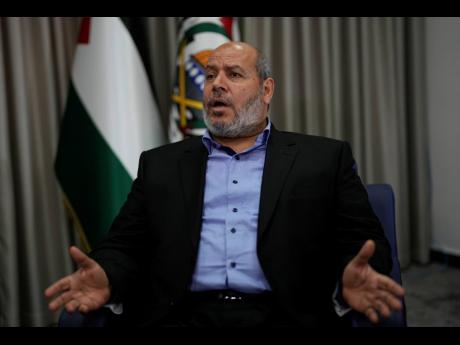Hamas says it will lay down arms if independent Palestinian state is established
ISTANBUL (AP):
A top Hamas political official told The Associated Press the Islamic militant group is willing to agree to a truce of five years or more with Israel and that it would lay down its weapons and convert into a political party if an independent Palestinian state is established along pre-1967 borders.
The comments by Khalil al-Hayya in an interview Wednesday came amid a stalemate in months of talks for a ceasefire in Gaza. The suggestion that Hamas would disarm appeared to be a significant concession by the militant group officially committed to Israel’s destruction.
But it’s unlikely Israel would consider such a scenario. It has vowed to crush Hamas following the deadly October 7, 2023 attacks that triggered the war, and its current leadership is adamantly opposed to the creation of a Palestinian state on lands Israel captured in the 1967 Mideast war.
Al-Hayya, a high-ranking Hamas official who has represented the Palestinian militants in negotiations for a ceasefire and hostage exchange, struck a sometimes defiant and other times conciliatory tone.
Speaking to the AP in Istanbul, Al-Hayya said Hamas wants to join the Palestine Liberation Organization, headed by the rival Fatah faction, to form a unified government for Gaza and the West Bank. He said Hamas would accept “a fully sovereign Palestinian state in the West Bank and Gaza Strip and the return of Palestinian refugees in accordance with the international resolutions,” along Israel’s pre-1967 borders.
If that happened, he said, the group’s military wing would dissolve.
“All the experiences of people who fought against occupiers, when they became independent and obtained their rights and their state, what have these forces done? They have turned into political parties and their defending fighting forces have turned into the national army,” he said.
Over the years, Hamas has sometimes moderated its public position with respect to the possibility of a Palestinian state alongside Israel. But its political programme still officially “rejects any alternative to the full liberation of Palestine, from the river to the sea” – referring to the area reaching from the Jordan River to the Mediterranean Sea, which includes lands that now make up Israel.
Al-Hayya did not say whether his apparent embrace of a two-state solution would amount to an end to the Palestinian conflict with Israel or an interim step toward the group’s stated goal of destroying Israel.
There was no immediate reaction from Israel or the Palestinian Authority, the internationally recognised self-ruled government that Hamas drove out when it seized Gaza in 2007, a year after winning Palestinian parliamentary elections. After the Hamas takeover of Gaza, the Palestinian Authority was left with administering semi-autonomous pockets of the Israeli-occupied West Bank.
The Palestinian Authority hopes to establish an independent state in the West Bank, east Jerusalem and Gaza – areas captured by Israel in the 1967 Mideast war. While the international community overwhelmingly supports such a two-state solution, Israeli Prime Minister Benjamin Netanyahu’s hard-line government rejects it.

